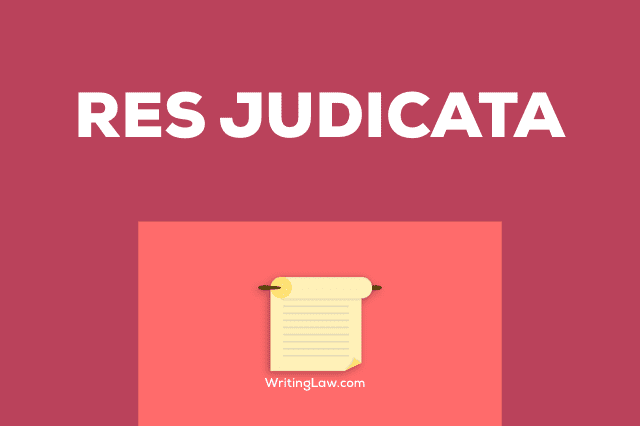In this law article, you will learn about the doctrine of res judicata under the Indian Civil Procedure Code of 1908.
Meaning of Res Judicata in CPC
The word “res” means subject matter, and the word “judicata” means decided.
Res judicata is the Latin term for a matter judged. It means a thing decided. Section 11 of the Civil Procedure Code, 1908 talks about the doctrine of res judicata.
Res judicata applies in a case where there has been a final judgment, and it is no longer subject to appeal. Res judicata can also be used to bar (stop, block) continued litigation of a case on the same issues between the same parties.
Further, the doctrine of res judicata includes two related concepts:
- Claim preclusion: Claim preclusion focuses on barring a lawsuit from being brought again on a legal cause of action that has already been finally decided and resolved between the parties.
- Issue preclusion: Issue preclusion prohibits the re-litigation of factual issues that have already been determined by a judge as a part of an earlier claim.
Definition of the Res Judicata
According to section 11 of the Civil Procedure Code, no court has the authority to try any new lawsuit or matters that have already been resolved in prior litigation between the same parties. The doctrine of res judicata applies to a case where a decision has been made that is final and cannot be appealed.
Also See: What Is Stay of Suit or Res Sub Judice Under CPC?
Res Judicata Is Based on 3 Maxims
The doctrine of res judicata is based on three maxims. They are:
1. Nemo debet bis vexari pro una et eadem causa: It means no man shall be punished twice for the same offence.
2. Interest Reipublicae Ut Sit Finis Litium: It means it is in the interest of the state that there should be an end to litigation. Or litigation must come to an end.
3. Res Judicata Pro Veritate Accipitur: It means that a judicial decision must be accepted as correct.
Conditions for Res Judicata
For the application of the doctrine of res judicata, the following conditions must be satisfied:
- There must be two lawsuits, one previous and one subsequent. “Previous lawsuit” means the lawsuit that was decided previously. It makes no difference when the lawsuit was filed; when the court makes its decision is what matters.
- The parties to both the lawsuits (former lawsuit and subsequent lawsuit) must be the same.
- The competent court must have finally decided on the former lawsuit/case.
- The matter at issue must be the same in the subsequent suit.
- Parties in both lawsuits must have litigated under the same title, i.e., similar legal action.
When Res Judicata Does Not Apply
According to the doctrine of res judicata, a new lawsuit can not be brought against any lawsuit that has already been heard and decided by the competent court. However, there are certain conditions when a new lawsuit can be brought against any lawsuit that has been adjudged before, and the doctrine of res judicata would not apply.
The exceptions to the doctrine of res judicata are:
1. Cases Related to Income Tax and Sales Tax
The doctrine of res judicata does not apply to cases related to income tax and sales tax. The Supreme Court held in Instalment Supply Private Limited vs Union of India (1962) that each year’s assessment is final for that year and does not apply to succeeding or subsequent years since it only determines the tax for that particular time frame.
2. Special Leave Petition
The doctrine of res judicata contained in section 11 of the Civil Procedure Code does not apply when the special leave petition is dismissed without adjudication or decision.
3. Different Causes of Action
The doctrine given under section 11 of the Civil Procedure Code will not be applied when there is a different cause of action in any subsequent suit.
4. Arbitration Cases
Res judicata does not apply to arbitration cases, and it is at the discretion of the parties to bring the appeal or not. Section 8 of the Arbitration and Conciliation Act provides the provision for the same.
Important: Some sources say that res judicata applies to arbitration proceedings, and some sources say it doesn’t. It is nowhere accurately mentioned. So, please take this with a pinch of salt.
5. Writ of Habeas Corpus
The general rule is that the doctrine of res judicata can be applied to writ lawsuits, but it should not violate any citizen’s fundamental rights. However, the doctrine of res judicata does not apply to the writ of habeas corpus. Due to the court’s failure to decide on the issues of the case, a future petition under Article 32 cannot be prevented by dismissing the initial petition as withdrawn.
Read Next:
- Difference and Similarity Between Res Sub Judice and Res Judicata in CPC
- What Is Representative Suit as Per Civil Procedure Code
- Iftikhar Ahmed vs Syed Meharban Ali and Others – Case Explained
- 18 Most Important Amendments to the Indian Constitution - 12th August 2023
- 8 Kinds and Theories of Punishment - 22nd July 2023
- What Is the Meaning of Res Judicata in Civil Procedure Code? - 22nd January 2023








